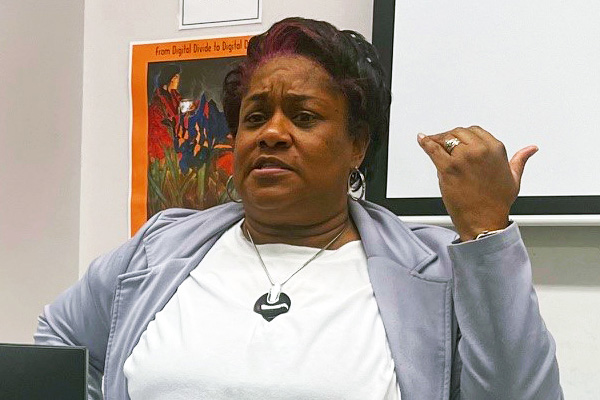STLCC Professor Guides U.S. Cyber Team in Global Competitions
October 04, 2024
Posted by School of Science, Technology, Engineering and Math in Programs and Pathways

Hardly a day goes by that the news media doesn’t report on a cybersecurity breach that has caused havoc for a company or even entire sectors of the economy. With the growing dependence on networks, the need to protect systems has also expanded.
Groups all over the world are working to identify and attract the best young talent and bring global awareness to the education and skills needed for cybersecurity in today’s world. They’re also having fun doing it. This year, there will be an Archer among them.
Phyllis Davis, associate professor of information systems at STLCC, has been tabbed to help determine the best the United States has to offer and put together a team for two international competitions.
“Cybersecurity is essential for safeguarding our digital properties and maintaining national security,” she said. “The competition provides a platform to highlight abilities, nurture a talent reservoir, enhance the capabilities of our budding cyber competitors, and encourage more students to consider careers in cybersecurity.
It's an honor to represent the U.S. and gain insights from international colleagues.”
The Competitions
The U.S. team’s first competition is the European Cybersecurity Challenge from Oct. 7-11 in Turin, Italy, which is hosted by the European Union Agency for Cybersecurity. Squads, made up of 10 players ages 14- to 24-years-old, come from throughout Europe and some invited non-European countries to participate in onsite cybersecurity competitions. First held in 2015, this is the first year that nations from outside the European Union will participate.
They’ll compete in a game known as capture the flag in which teams must find a hidden file or piece of information somewhere in the targeted environment. This popular training exercise helps evaluate a person’s skills and knowledge of various subdomains, or subsections of a website.
At the end of October, the team travels to Santiago, Chile, for the International Cybersecurity Challenge. (Davis likely won’t travel with the team.) Organized by a consortium of groups from across the world, 65 teams are scheduled to participate. Open to athletes as old as 25, the competition typically includes web and system exploitations, cryptography, reverse engineering, hardware, and attack and defense skills.
This is the third ICC, with the first in 2022. Team Europe has won the first two competitions with the U.S. team finishing second in the inaugural event and fourth in 2023.
“After a rigorous two-month application and interview process,” Davis said, “I was invited to become a member of the team.”
Leading the way
She was appointed one of the six new mentors for the U.S. teams, a role that reflects her outstanding cyber skills and knowledge. She was selected after a vetting process that evaluated her credentials, experience and ability to connect with the athletes.
As a mentor, she will help develop the pipeline program, a curriculum that aims to train and nurture future cyber competitors. She will also assist in choosing the team members who will travel and compete in the international events, based on their performance, summaries and interviews.
“I felt privileged and thrilled to be selected to serve as a mentor for the U.S. Cyber Team,” Davis said. “After an extended period of anticipation, I was elated to receive the news and am fully prepared to serve in this capacity with dedication and enthusiasm. This opportunity allows me to support the coaching team, serve the athletes, and continue my journey of learning and growth, which aligns perfectly with my calling to serve others."
The team is made up of competitors who participated in the U.S. Cyber Open earlier this year and are currently involved with the U.S. Cyber Combine that started June 24 and stretches to Sept. 2. Their performances at these two events, along with personal summaries and an interview will help Davis and the other mentors choose the teams for the upcoming international events.
Davis will work with the athletes to increase their skills and prepare them for the competitions. She’ll also assist with creating a curriculum for the Pipeline Program designed to develop and train future participants. All of Davis’ work leading up to the games will be done online and outside of work hours.
“Working with young people is a privilege and helping them prepare not just to compete in international cybersecurity tournaments, but also to build successful careers in this field, is incredibly rewarding,” she said. “My goal is to guide them in developing their technical skills while also emphasizing the importance of teamwork.
“It’s crucial that they learn to value the unique gifts and talents that each team member brings to the table. By fostering a culture of mutual respect and collaboration, we can ensure that they are not only ready to excel in competitions but also prepared to make meaningful contributions to the cybersecurity industry.”
Cybersecurity at STLCC
STLCC’s cybersecurity programs prepare information technology students for entry-level positions in information assurance and security. Through theory and hands-on experience, students develop skills in implementing security measures, responding to breaches and safeguarding digital infrastructure. The curriculum covers various areas including computer architecture, programming, networking, cryptography and risk assessment.
The College offers an associate of applied science and a certificate of proficiency. The certificate is recommended for people who already possess a degree in any area and are looking to obtain cybersecurity skills.
The National Security Agency and the National Centers for Academic Excellence in Cybersecurity have designated St. Louis Community College as a National Center of Academic Excellence in Cyber Defense. This means that STLCC’s robust cybersecurity program meets the national training standards.





